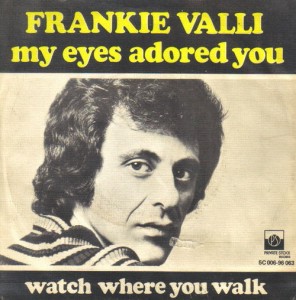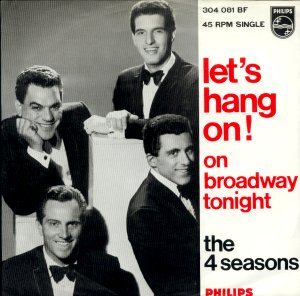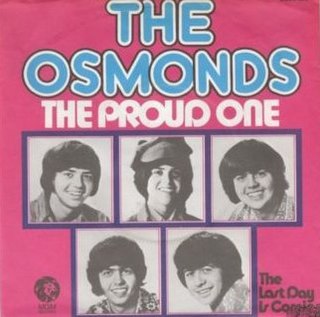
"Just the Way You Are" is a song by Billy Joel from his fifth studio album The Stranger (1977), released as the album's second single in early November 1977. It became both Joel's first US Top 10 and UK Top 20 single, as well as Joel's first gold single in the US. The song also topped the Billboard Easy Listening Chart for the entire month of January 1978.

"December, 1963 " is a song originally performed by the Four Seasons, written by original Four Seasons keyboard player Bob Gaudio and his future wife Judy Parker, produced by Gaudio, and included on the group's album Who Loves You (1975).

"Since I Don't Have You" is a song written and composed by Jackie Taylor, James Beaumont, Janet Vogel, Joseph Rock, Joe Verscharen, Lennie Martin, and Wally Lester. It was first a 1958 hit single for the doo-wop group the Skyliners on the Billboard Hot 100. Country music singer Ronnie Milsap had a hit with the song in 1991. American hard rock band Guns N' Roses also had some success in 1994 with their version of the song which reached the top 10 on the UK Singles Chart.

"Venus" is a song written by Ed Marshall. The most successful and best-known recording of the track was by Frankie Avalon and released in 1959, when it reached the top of the Billboard Hot 100.
"Why" is a hit song recorded by Frankie Avalon in 1959. It reached No. 1 on the U.S. Billboard Hot 100 chart published on the week of December 28, 1959. It was Avalon's second and final No. 1 hit.

"All the Love in the World" is a song by Dionne Warwick, released as a single in 1982. It was written by the Bee Gees, and was featured on Warwick's hit album Heartbreaker, produced by Barry Gibb, Karl Richardson, and Albhy Galuten. Barry Gibb provides backing vocals on the track. It was Warwick's third single from the album, behind "Heartbreaker" and "Take the Short Way Home". The song just missed the Billboard Hot 100 in the US, but charted at number 16 on the US Adult Contemporary Chart and at number 10 on the UK Singles Chart.

"Sherry" is a song written by Bob Gaudio and recorded by The Four Seasons.

"My Eyes Adored You" is a 1974 song written by Bob Crewe and Kenny Nolan. It was originally recorded by The Four Seasons in early 1974. After the Motown label balked at the idea of releasing it, the recording was sold to lead singer Frankie Valli for $4000. After rejections by Capitol and Atlantic Records, Valli succeeded in getting the recording released on Private Stock Records, but the owner/founder of the label, Larry Uttal, wanted only Valli's name on the label. It is from the album Closeup. The single was released in the US in November 1974 and topped the Billboard Hot 100 in March 1975. "My Eyes Adored You" also went to number 2 on the Easy Listening chart. Billboard ranked it as the No. 5 song for 1975.
Kenneth "Kenny" Nolan is an American singer-songwriter from Los Angeles.

"Who Loves You" is the title song of a 1975 album by The Four Seasons. It was composed by Bob Gaudio and Judy Parker and produced by Gaudio. It reached number 3 on the Billboard Hot 100 in November 1975.

"Silver Star" is the lead song on the Four Seasons album Who Loves You. As was the case of all the songs on the LP, it was written by Bob Gaudio and Judy Parker and produced by Gaudio. Drummer Gerry Polci sang lead. Frankie Valli's contribution was limited to harmony vocals, since he was gradually losing his hearing in the 1970s due to otosclerosis. An operation restored most of Valli's hearing in the 1980s.

"Let's Hang On!" is a song composed by Bob Crewe, Sandy Linzer, and Denny Randell that was popularized by the Four Seasons in 1965.

"C'mon Marianne" is a song composed by L. Russell Brown and Raymond Bloodworth and popularized by The Four Seasons in 1967. Produced by Bob Crewe, the single was the last Four Seasons single to reach the Top Ten of the Billboard Hot 100 chart in the 1960s, and their last Top Ten hit until "Who Loves You" in 1975.

"We're All Alone" is a song written by Boz Scaggs, which became a hit for Frankie Valli in 1976. The next year it was a top-ten hit for Rita Coolidge in the US and the UK. Scaggs introduced it on his 1976 album Silk Degrees, and included it as the B-side of two of the four single releases from that LP, including "Lido Shuffle".

"Then You Can Tell Me Goodbye" is a song written by John D. Loudermilk. It was first released in 1962 by Don Cherry, as a country song and again as a doo-wop in 1967 by the group The Casinos on its album of the same name, and was a number 6 pop hit that year. The song has since been covered by Eddy Arnold, whose version was a number 1 country hit in 1968, and by Neal McCoy, whose version became a Top 5 country hit in 1996.

"The Proud One" is a 1966 single written by Bob Gaudio and Bob Crewe and originally performed by Frankie Valli as part of his debut solo album, The 4 Seasons Present Frankie Valli Solo. Valli's version, which featured the Seasons on instrumental backing but not vocals, peaked at #68 in the U.S. and #64 in Canada. Billboard claimed that "the electric sound of Valli is used to perfection in this powerful ballad, stating that the "easy-go dance beat [is] effective." Cash Box said that it is a "powerhouse" and that "the Valli sound holds the moving, teen-oriented tale of love together and the sweeping arrangement adds a must spin again quality to it."
Rogue were a British soft rock band who were active between 1975 and 1979, comprising Guy Fletcher, Al Hodge and John Hodkinson. The group's original material was all written by Fletcher and his songwriting partner Doug Flett, though Flett was never a member of the band.

"I Guess the Lord Must Be in New York City" is a song written and recorded by singer-songwriter Nilsson in 1969. A track from his fourth studio album, Harry, it became his second charting single.

"Don't Throw It All Away" is a song written by British musician Gary Benson and first released by the Shadows on their 1975 album Specs Appeal. Benson released his version as a single later the same year, which reached number 20 on the UK Singles Chart in the fall of 1975.

The discography of American country music artist Charley Pride contains 75 singles, one other charting song, two promotional singles, one featured single and 11 music videos. Pride signed his first recording contract with RCA Victor in 1966. His first two singles failed to become hits. His third single, "Just Between You and Me," became a hit when it reached the top ten of the country charts. Pride had several more top ten hits over the next several years until he had first chart-topper in 1969. The single, "All I Have to Offer You ," reached number one on the Billboard Hot Country Songs chart and spent 17 weeks charting. This was followed by five more number one hits, including "Is Anybody Goin' to San Antone." All of these singles also reached low-end positions on the Billboard Hot 100.

















